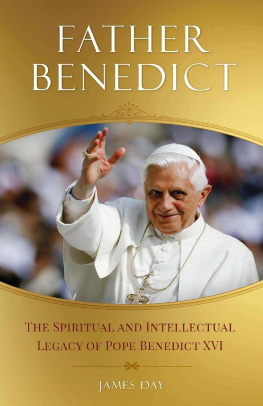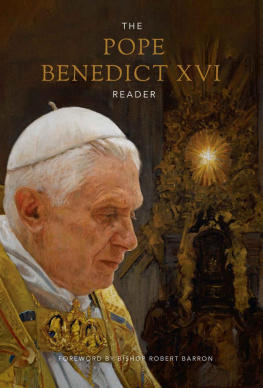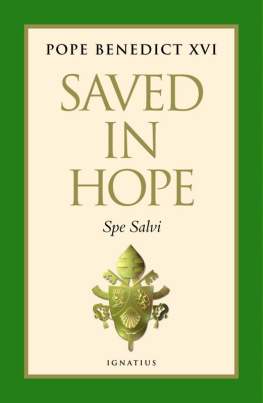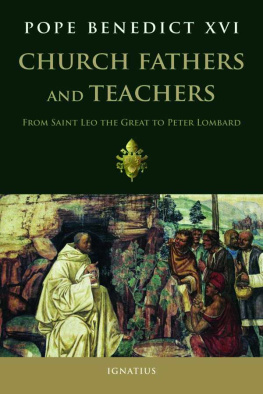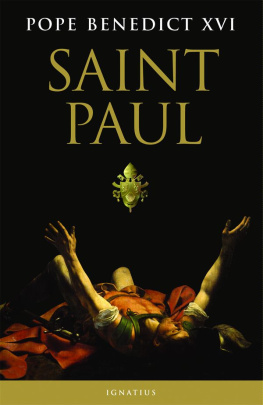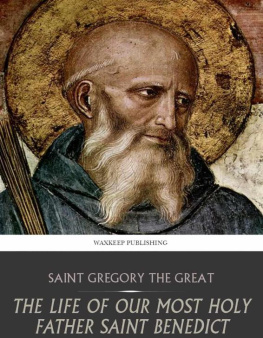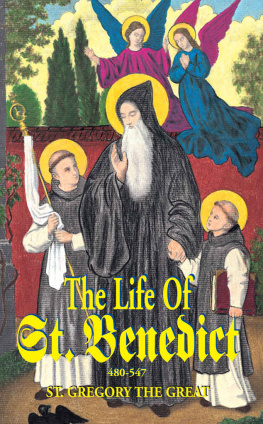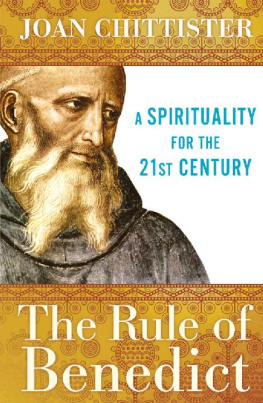James Day - Father Benedict: The Spiritual and Intellectual Legacy of Pope Benedict XVI
Here you can read online James Day - Father Benedict: The Spiritual and Intellectual Legacy of Pope Benedict XVI full text of the book (entire story) in english for free. Download pdf and epub, get meaning, cover and reviews about this ebook. year: 2016, publisher: Sophia Institute Press, genre: Religion. Description of the work, (preface) as well as reviews are available. Best literature library LitArk.com created for fans of good reading and offers a wide selection of genres:
Romance novel
Science fiction
Adventure
Detective
Science
History
Home and family
Prose
Art
Politics
Computer
Non-fiction
Religion
Business
Children
Humor
Choose a favorite category and find really read worthwhile books. Enjoy immersion in the world of imagination, feel the emotions of the characters or learn something new for yourself, make an fascinating discovery.
Father Benedict: The Spiritual and Intellectual Legacy of Pope Benedict XVI: summary, description and annotation
We offer to read an annotation, description, summary or preface (depends on what the author of the book "Father Benedict: The Spiritual and Intellectual Legacy of Pope Benedict XVI" wrote himself). If you haven't found the necessary information about the book — write in the comments, we will try to find it.
James Day: author's other books
Who wrote Father Benedict: The Spiritual and Intellectual Legacy of Pope Benedict XVI? Find out the surname, the name of the author of the book and a list of all author's works by series.
Father Benedict: The Spiritual and Intellectual Legacy of Pope Benedict XVI — read online for free the complete book (whole text) full work
Below is the text of the book, divided by pages. System saving the place of the last page read, allows you to conveniently read the book "Father Benedict: The Spiritual and Intellectual Legacy of Pope Benedict XVI" online for free, without having to search again every time where you left off. Put a bookmark, and you can go to the page where you finished reading at any time.
Font size:
Interval:
Bookmark:
James F. Day
Father Benedict

The Spiritual and Intellectual Legacy of Pope Benedict XVI
SOPHIA INSTITUTE PRESS
Manchester, New Hampshire
Printed in the United States of America. All rights reserved.
Cover design by Perceptions Design Studio.
On the cover: Pope Benedict XVI delivers his blessing, October
14, 2006 (File 06101404128) AP Photo/Andrew Medichini.
Unless otherwise noted, biblical references in this book are taken from the Catholic Edition of the Revised Standard Version of the Bible, copyright 1965, 1966 by the Division of Christian Education of the National Council of the Churches of Christ in the United States of America. Used by permission. All rights reserved.
Quotations from English translations of papal documents and addresses are from the Vatican website (w2.vatican.va) Libreria Editrice Vaticana. All rights reserved. Used with permission.
No part of this book may be reproduced, stored in a retrieval system, or transmitted in any form, or by any means, electronic, mechanical, photocopying, or otherwise, without the prior written permission of the publisher, except by a reviewer, who may quote brief passages in a review.
Sophia Institute Press
Box 5284, Manchester, NH 03108
1-800-888-9344
www.SophiaInstitute.com
Sophia Institute Press is a registered trademark of Sophia Institute.
Library of Congress Cataloging-in-Publication Data
Names: Day, James F., author.
Title: Father Benedict : the spiritual and intellectual legacy of Pope
Benedict XVI / James F. Day.
Description: Manchester, New Hampshire : Sophia Institute Press, 2016. |
Includes bibliographical references.
Identifiers: LCCN 2016025141 | ISBN 9781622823376 (pbk. : alk. paper) 978-1-622823-383
Subjects: LCSH: Benedict XVI, Pope, 1927-
Classification: LCC BX1378.6 .D39 2016 | DDC 282.092 dc23 LC record available at https://lccn.loc.gov/2016025141
For the faculty, administrators,
staff, and students,
past, present, and future, of
St. Michael School, Independence, Ohio
Contents
Epilogue:
About the Author:
Introduction
At Mass on March 25, 2012, at Bicentenario Park in Lon, Mexico, only a few knew that the celebrant was suffering from a contusion on his head, concealed by the white papal zucchetto. He would complete the voyage, including a visit to Cuba, but it would prove to be the 265th Bishop of Romes final trans-Atlantic journey. Exactly a year later, Jorge Bergoglio, as Pope Francis, would embark on his first Holy Week liturgical events, with images of his Holy Thursday service at the Prison for Minors in Rome seizing the world.
The night before, while staying at the house of the Capuchin Sisters in Lon, Pope Benedict XVI, struggling to find his way around the dark, unfamiliar room, slammed his head, causing a bleeding wound.
That night in Mexico, his head bleeding, a month shy of eighty-five, and having steered the barque of Peter for seven years under a hostile antipathy toward the Church, a drained Benedict XVI knew that his last gift to give would possibly be his greatest and most unexpected. Just as no Jesuit becomes pope, no pope leaves the office alive. Yet both things happened in 2013.
Not since Gregory XII in 1415 had the supreme pontiff of the Roman Catholic Church resigned a resignation that ended the Schism (13781417) that had spawned numerous antipopes. Before Gregory, Pope Celestine V abdicated in 1294 and was canonized less than twenty years later. In light of Benedicts announcement on February 11, 2013, his April 2009 visit to LAquila, torn apart by an earthquake three weeks earlier, took on new significance: during that visit, Benedict laid his pallium on the tomb of Saint Celestine V at Santa Maria di Collemaggio. The significance of this gesture should not undermine the Popes presence that day to express solidarity with those whose lives were disrupted and lost by that earthquake. The stop in the Basilica of Collemaggio to venerate the remains of Pope Saint Celestine V gave me an opportunity to feel tangibly this citys wounded heart, he said to the crowd gathered in LAquila. My homage is intended as a homage to the history and faith of your region and to all of you who identify with this Saint.
As symbolic as that image might seem in hindsight, Benedict was not the only successor of Saint Peter to pray before the memorial to the medieval pope who resigned. Both Paul VI, in 1966, and Pius XII, in 1948, visited Celestines tomb. Paul VI seriously contemplated resignation and seclusion to Monte Cassino, the monastery built by Saint Benedict in 529. It was a notion that many successors of St. Celestine have contemplated but never attempted until Joseph Ratzinger.
It was in Monte Cassino in 2000 that, secluded from the modern world for a few days, German publicist Peter Seewald interviewed Cardinal Ratzinger on Catholic theology an interview that would later be published as God and the World: Believing and Living in Our Time . This was not their first collaboration. A few years earlier, Salt of the Earth became a spiritual smash hit, revealing that the prefect of the Congregation for the Doctrine of the Faith was not a remote authoritarian figure disconnected from the trials of life. He was a pastor very much aware of the modern travails of the spiritual journey. The partnership would continue through Benedicts pontificate with Light of the World in 2010, highlighting Pope Ratzingers prescient views as well as his accessibility to the average reader. These works from Peter Seewald invite us to spend time with the man Joseph Ratzinger, refreshingly candid as he ruminates spontaneously on the contemporary socio-religious landscape. More impressive than his own perspective is the recurring commentary on the reconciliation between the believer and the world, and of a healthy balance between faith and reason.
Being Christian must not become a sort of archaic stratum to which I cling somehow and on which I live to a certain extent alongside of modernity. Christianity is itself something living, something modern, which thoroughly shapes and forms all of my modernity and in this sense actually embraces it.God is the real central theme of my endeavors, Joseph Ratzinger confesses. Through dozens of published books, lectures, articles, retreats, letters, homilies, and interviews over six decades, his spirituality emerges, the soul of a true priest exposed. As one journeys with him, the theologian gives way to the spiritual sage: he really believes in what he says. His spiritual mentor, the Italian-born German priest Romano Guardini, wrote of his own book The Conversion of Augustine , The present work on Augustine does not attempt to add anything to the body of historical research on the man. Its only aim is to present his personality and thought in the everlasting form of his writings as a perennial possibility of Christian existence. The same is attempted here about Joseph Ratzinger.
Ratzinger served as cardinal-prefect of the Congregation for the Doctrine of the Faith for almost a quarter of a century. The role of the office the former holy office of the Inquisition, the dogmatic strong arm for the Pope and the perception of its German enforcer earned him some clever nicknames: panzerkardinal , Gods Rottweiler, German Shepherd. And even if his ascension in 2005 as Benedict XVI infused a renewed pastoral vitality and spirit within him, the more commanding public perception remained, casting Joseph Ratzinger as the cold, doctrinal authoritarian.
By the end of his pontificate, this popular view toward him persisted and he remained overall unfavorable, even as a steady undercurrent of devotion quietly developed. At this time, two monstrous crises were unfolding. Within the Church festered the earthshaking sexual-abuse crisis. Outside the Church, the dissolution of ethical standards that characterized the rise of rampant secularism. To Benedict, the suspension of objective truth the abandonment of divine love was the root of them both. Nevertheless, Benedict alone seemed accused of being the root of the abuse problem. But still he forged on, becoming the first pope to meet, repeatedly, with victims of clergy sexual abuse.
Next pageFont size:
Interval:
Bookmark:
Similar books «Father Benedict: The Spiritual and Intellectual Legacy of Pope Benedict XVI»
Look at similar books to Father Benedict: The Spiritual and Intellectual Legacy of Pope Benedict XVI. We have selected literature similar in name and meaning in the hope of providing readers with more options to find new, interesting, not yet read works.
Discussion, reviews of the book Father Benedict: The Spiritual and Intellectual Legacy of Pope Benedict XVI and just readers' own opinions. Leave your comments, write what you think about the work, its meaning or the main characters. Specify what exactly you liked and what you didn't like, and why you think so.

